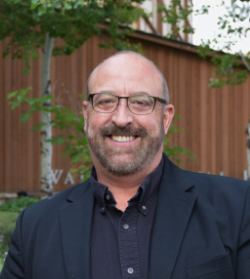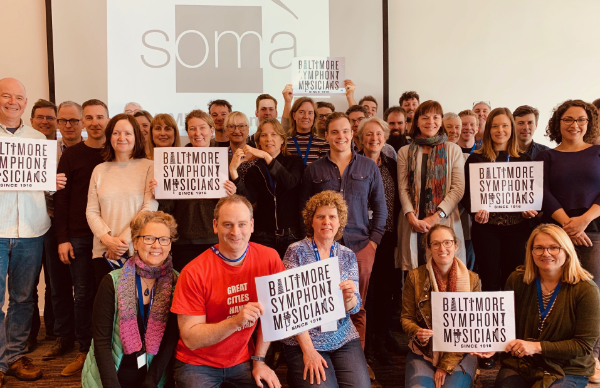
Photo credit: Anna Sykes
This has been a terribly difficult summer for the Baltimore Symphony musicians—frankly, it has been a terribly difficult year. From the moment we arrived back in Baltimore following our triumphant tour to the UK and Ireland in September of 2018, we were caught in the shifting sands of the BSO’s financial uncertainty. First, the management wasn’t ready to negotiate on September 9. They then offered, and we turned down, a four-month extension, and we decided to play and talk. Finally the true intentions of our leadership were revealed in its October 30 proposal to lop 12 weeks off of our 52-week season, and thereby reduce us to a 40-week orchestra, and to reduce our annual salary by 20% as well.
The next eight months were a roller-coaster affair, with a short temporary extension until January 15 and then an agreement to play and talk. At this point, the musicians agreed not to strike and BSO management agreed not to lock us out—until May 30 when the leadership suddenly decided that détente was no longer in its interest. With two weeks’ notice, they abruptly cancelled the summer season and informed the musicians that we would be locked out on June 17. This decision was prompted by the failure of Maryland Governor Hogan to release $1.6 million in funding that had been provided for in a bill that the musicians and the community had lobbied the Maryland General Assembly to pass. This funding would have helped support the remainder of the season, while a “work group” mandated by the same House Bill 1404 provided analysis of the BSO’s finances and function.
Instead, we were out on the street. It was a long hot summer on the picket line. We thought we might maintain the picket for the first few weeks and then taper off while people went off to try to make some money in festivals and subbing with other orchestras, and indeed many of our players had no choice but to do that. But there was a contingent of warriors in our orchestra who were indomitable. They were there every day that we scheduled picketing, through sweltering heat and rainstorms. A sense of purpose grew in our ranks, and our unity was never in doubt. We were regularly joined by brothers and sisters from so many other unions, including the teachers and nurses unions, AGMA, IBEW, UFCW, AFSCME, IATSE, and too many more to name, as well as a host of community supporters and our very own Save Our BSO group. One of the local amateur musicians who played in our BSO Academy started a GoFundMe Campaign to supply us with meals while we marched. We eventually started our own GoFundMe Campaign, which has now raised nearly $84,000.
We are grateful to the musicians of ICSOM orchestras around the country for their collective and individual contributions to our cause, both financially through the Call to Action and personally through their presence on our picket line and working with us in our self-produced concerts. We thank ICSOM leadership for the active role it has played, issuing the Call to Action, sending letters and opinion pieces from Meredith Snow and Paul Austin to the editor of the Baltimore Sun, and offering behind-the-scenes assistance. We thank Paul Austin, Peter de Boor, and former chair Bruce Ridge for traveling to Baltimore to join us on the picket line. We’ve learned so much about what it means to be there for others by observing how others showed up for us this summer, and how we showed up for each other.
There were times I couldn’t be on the picket line because I had to be on my computer writing press releases or talking to reporters. Even on those days when I was at the picket line, I was busy on my phone or talking to a reporter. But I never had to worry about whether there would be a picket line or if our message was getting out, because I knew my colleagues would be there. They showed up every day and in every way we needed to, and Baltimore showed up for us in response.

SOMA conference participants showing their support for the BSO musicians (Note: see “Antipodean Advocacy” on page 6)
Photo credit: Bruce Ridge
Not only did our supporters show up on our picket line, they showed up with money to strengthen us and ultimately to get us back on the stage. A generous group of donors emerged that offered over $1 million to help put us back on the stage. And on Friday, September 20, at 11:30 p.m., we managed to come to a one-year agreement with BSO management. Because of these generous donors, we were able to hold our ground against salary concessions. We also agreed on a “Vision Committee” that will allow the musicians and all of the stakeholders of the organization—including these donors—to be more involved in the decision making processes, including determining the season length. In an unconventional format, we agreed to a shorter schedule of 40 working weeks for the remainder of the 19–20 season, which will include two weeks of summer programming. Management agreed to fund our regular weekly salary throughout the summer non-performance weeks. And although we will take the stage on Friday, September 27, to thunderous applause, we know that this is not the end. It’s only the beginning of the fight to preserve what has been built here over the last 104 years. Please stay with us as we fight on to #SaveOurBSO.
Note: The author is co-chair of the Baltimore Symphony Orchestra Players’ Committee.





